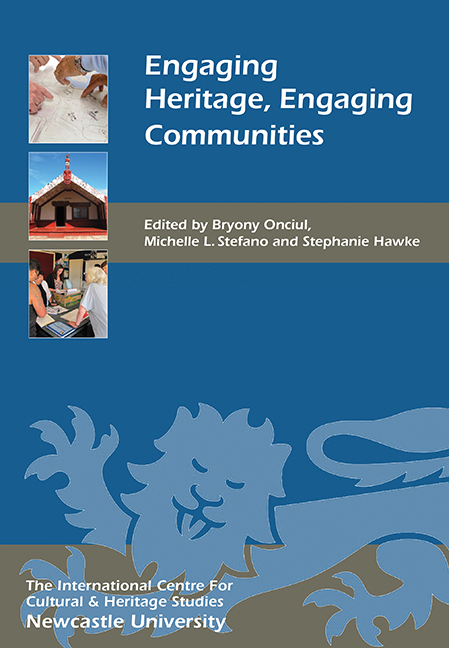Book contents
- Frontmatter
- Contents
- List of Illustrations
- Acknowledgments
- Introduction
- Engaging Concepts
- 1 The Gate in the Wall: Beyond Happiness-making in Museums
- 2 Assembling Communities: Curatorial Practices, Material Cultures and Meanings
- 3 Interview – John Tunbridge
- 4 Interview – Gregory Ashworth
- 5 Engaging with Māori and Archaeologists: Heritage Theory and Practice in Āotearoa New Zealand
- 6 Horizontality: Tactical Politics for Participation and Museums
- Engaging Creatively
- Engaging Challenges
- List of Contributors
- Index
- Miscellaneous Endmatter
2 - Assembling Communities: Curatorial Practices, Material Cultures and Meanings
from Engaging Concepts
Published online by Cambridge University Press: 13 April 2017
- Frontmatter
- Contents
- List of Illustrations
- Acknowledgments
- Introduction
- Engaging Concepts
- 1 The Gate in the Wall: Beyond Happiness-making in Museums
- 2 Assembling Communities: Curatorial Practices, Material Cultures and Meanings
- 3 Interview – John Tunbridge
- 4 Interview – Gregory Ashworth
- 5 Engaging with Māori and Archaeologists: Heritage Theory and Practice in Āotearoa New Zealand
- 6 Horizontality: Tactical Politics for Participation and Museums
- Engaging Creatively
- Engaging Challenges
- List of Contributors
- Index
- Miscellaneous Endmatter
Summary
Nations in the South Pacific face the dramatic dual pressures of local reinventions and global engagements over processes of political decolonisation (both external and internal), cultural revitalisation and economic development. However, we have a limited understanding of how cultural practices can embody these processes and illuminate the ways in which they are being negotiated. This chapter addresses this situation by laying the foundation for a documentation and analysis of the contribution of curatorial practices in museums to (re)negotiating identities, cultural revitalisation and economic development.
The South Pacific region is strongly affected by global forces such as mass migration and media through rapid technological developments in transportation and communication. However, while transpacific connections and crossings have multiplied and accelerated over the last decades, one should not lose sight of their grounding in historical processes of sea voyages, encounter and exchange. Scholarship has begun to illuminate the endemic movements of people, histories and practices across the Pacific, which cannot be exhaustively explained through totalising understandings of colonialism or conventional categories of analysis such as the nation. Instead, the South Pacific region has always been characterised by transpacific entanglements of histories, cultures and economies (Dürr and Schorch 2016; Hau'ofa 1994; Matsuda 2012; Thomas 2011).
Museums have not only functioned as mirrors that reflect these processes but have been involved as actors in the processes themselves (Bennett 2013; Bennett et al 2014). That is, museums have played an active role in imperial colonisation and its political decolonisation, scientific and anthropological knowledge production and its postcolonial critique, and contemporary cultural revitalisation and economic development. Museums, then, offer a window into these larger processes and an empirically grounded illustration of the underpinning complexity. The complex function of museums in mediating the cultural, political and economic dimensions of contemporary life is particularly prominent in the South Pacific. Here, a plethora of new museums have emerged and been branded ‘experiments in culture’ (Healy and Witcomb 2006), implicated in the ‘making of culture’ (Message 2006) and the creation of ‘destinations’ (Kirshenblatt-Gimblett 1998). South Pacific museums appear at the cutting edge of recent developments in museum and heritage theory and practice, especially through the active engagement with Indigenous concepts, practices and forms of knowledge production (Kreps 2007; Stanley 2007).
- Type
- Chapter
- Information
- Engaging Heritage, Engaging Communities , pp. 31 - 46Publisher: Boydell & BrewerPrint publication year: 2017



